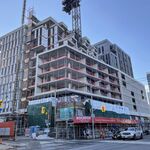nfitz
Superstar
Then why won't the LRT be segragated in an exclusive ROW if most of the Transitway already is?Not much of the Transitway today is not segregated in an exclusive ROW.
Then why won't the LRT be segragated in an exclusive ROW if most of the Transitway already is?Not much of the Transitway today is not segregated in an exclusive ROW.
LAz,
There's isn't Transit City style LRT. It's more in line with what Ottawa's building. That certainly makes it rapid transit.
Ottawa's LRT is only grade-separated in the core. It's at-grade elsewhere. Not that it matters given that it's segregated and exclusive along the entire ROW (and that's far more relevant). I see the Waterloo system in the same light. No grade separation. But tons of exclusive ROW especially the future bits.
I assume this system will make use of that annoyingly underused railway track which you need to cross to visit UW? (i.e. use it as ROW if not the actual track itself)
Who owns that track anyways, CP, CN?
That said, RMC and CFB Kingston aren't the drivers in any transit planning scenario. But I do wonder if a Princess, University, King (or Ontario), Hwy 2 (across the causeway) routing would work. Start at the Ambassador Conference centre and run to RMC/Fort Henry, via Queen's and downtown. That's about an 8 km routing, all on the surface and covers the width of Kingston. Or maybe a Bath, Princess, Ontario, causeway routing? Getting across the causeway might be a tad expensive though.
BRT would definitely work better for Kingston and Halifax. But LRT is still a great choice for K-W, Hamilton, London and Windsor. We really need to get transit sorted out in all our cities though, so even the smaller ones can grow up and not sprawl out. If only people could invest a bit in their cities and their infrastructures.
I assume this system will make use of that annoyingly underused railway track which you need to cross to visit UW? (i.e. use it as ROW if not the actual track itself)
Who owns that track anyways, CP, CN?




